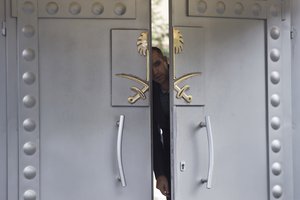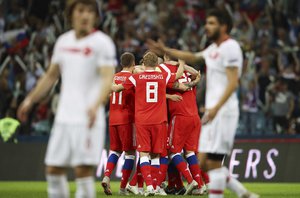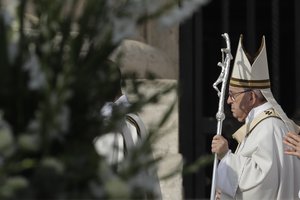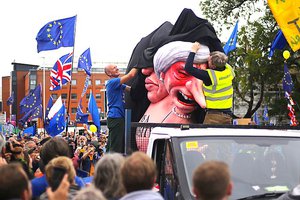Drama
Drama is the specific mode of narrative, typically fictional, represented in performance. The term comes from the Greek word δρᾶμα, drama, meaning action, which is derived from the verb δράω, draō, meaning to do or to act. The enactment of drama in theatre, performed by actors on a stage before an audience, presupposes collaborative modes of production and a collective form of reception. The structure of dramatic texts, unlike other forms of literature, is directly influenced by this collaborative production and collective reception. The early modern tragedy Hamlet (1601) by Shakespeare and the classical Athenian tragedy Oedipus the King (c. 429 BC) by Sophocles are among the masterpieces of the art of drama. A modern example is Long Day's Journey into Night (1956) by Eugene O’Neill.
The two masks associated with drama represent the traditional generic division between comedy and tragedy. They are symbols of the ancient Greek Muses, Thalia and Melpomene, the Muse of comedy represented by the laughing face, and the Muse of tragedy represented by the weeping face, respectively. Considered as a genre of poetry in general, the dramatic mode has been contrasted with the epic and the lyrical modes ever since Aristotle's Poetics (c. 335 BC)—the earliest work of dramatic theory.

500 Miles
He walked 300 miles
Just to bring me bread
His body like a sculpture
Almost decorated
and I’ll wake him as the dawn does
and we’ll break it on the bus
saying, “this was made for us, love”
In lovers communion for 500 miles
And in 500 miles will he break
Break me again?
In lovers communion for 500 miles
And in 500 miles will we brake
Even break
Step it up
Grab your phone
Get your suitcase
There is no time to waste
A big adventure awaits
Sad news, France suffered a late snow
The blooms break through the ice
In San Francisco
A guitar man finally confessed
He left that actress
Over the lakes with hearts touched by frost
We fought in the Land of the Midnight Sun
I lost myself
I lost myself
I walk 300 miles
Just to bring
To bring him bread
In love some gifts are simple
Others I underrated
So I’ll wake him as the dawn does
And we’ll face what any lovers must
Blueness pales within a flames lust
In lovers communion for 500 miles
And in 500 miles will he break
Break me again?
In lovers communion for 500 miles
And in 500 miles will he brake
Even break
will we brake
Even break
Brake
Even brake
Don’t slow down
Drama
Drama is the specific mode of narrative, typically fictional, represented in performance. The term comes from the Greek word δρᾶμα, drama, meaning action, which is derived from the verb δράω, draō, meaning to do or to act. The enactment of drama in theatre, performed by actors on a stage before an audience, presupposes collaborative modes of production and a collective form of reception. The structure of dramatic texts, unlike other forms of literature, is directly influenced by this collaborative production and collective reception. The early modern tragedy Hamlet (1601) by Shakespeare and the classical Athenian tragedy Oedipus the King (c. 429 BC) by Sophocles are among the masterpieces of the art of drama. A modern example is Long Day's Journey into Night (1956) by Eugene O’Neill.
The two masks associated with drama represent the traditional generic division between comedy and tragedy. They are symbols of the ancient Greek Muses, Thalia and Melpomene, the Muse of comedy represented by the laughing face, and the Muse of tragedy represented by the weeping face, respectively. Considered as a genre of poetry in general, the dramatic mode has been contrasted with the epic and the lyrical modes ever since Aristotle's Poetics (c. 335 BC)—the earliest work of dramatic theory.
Latest News for: Dramas
Butterfly, episode one review: 'An incredibly affecting drama'
The Little Drummer Girl review: Stylish crime drama which gives The Night Manager a run ...
Nicole Kidman radically transforms for drama 'Destroyer'
Goblin korean drama torrent free download
Big Brother's Piggy Bank Robbery task and Mystery Box auction causes plenty of drama
K-Drama: ‘Lost’ star debuts as lead in a new drama, ‘Ms. Ma’
Movie review: ‘The Hate U Give,’ powerful drama about race and activism is a must-see ...
 Tucson
14 Oct 2018
Tucson
14 Oct 2018
Parents' fury at Anna Friel's 'one-sided' transgender drama Butterfly that 'encourages children to swap gender'
A Kavanaugh Book Is Already On The Way So We Can Relive The Confirmation Drama ...
Want drama? This NLCS is bringing it -- and the best is yet to come
Willem Dafoe, 63, takes on Vincent van Gogh, 37, in drama 'At Eternity's Gate'
 HTO
14 Oct 2018
HTO
14 Oct 2018
Jenelle Evans’ Season 9 filming drama has Teen Mom 2 production up in arms despite ...
Donation drama enlivens a tight Arizona campaign
- 1
- 2
- 3
- 4
- 5
- Next page »


















